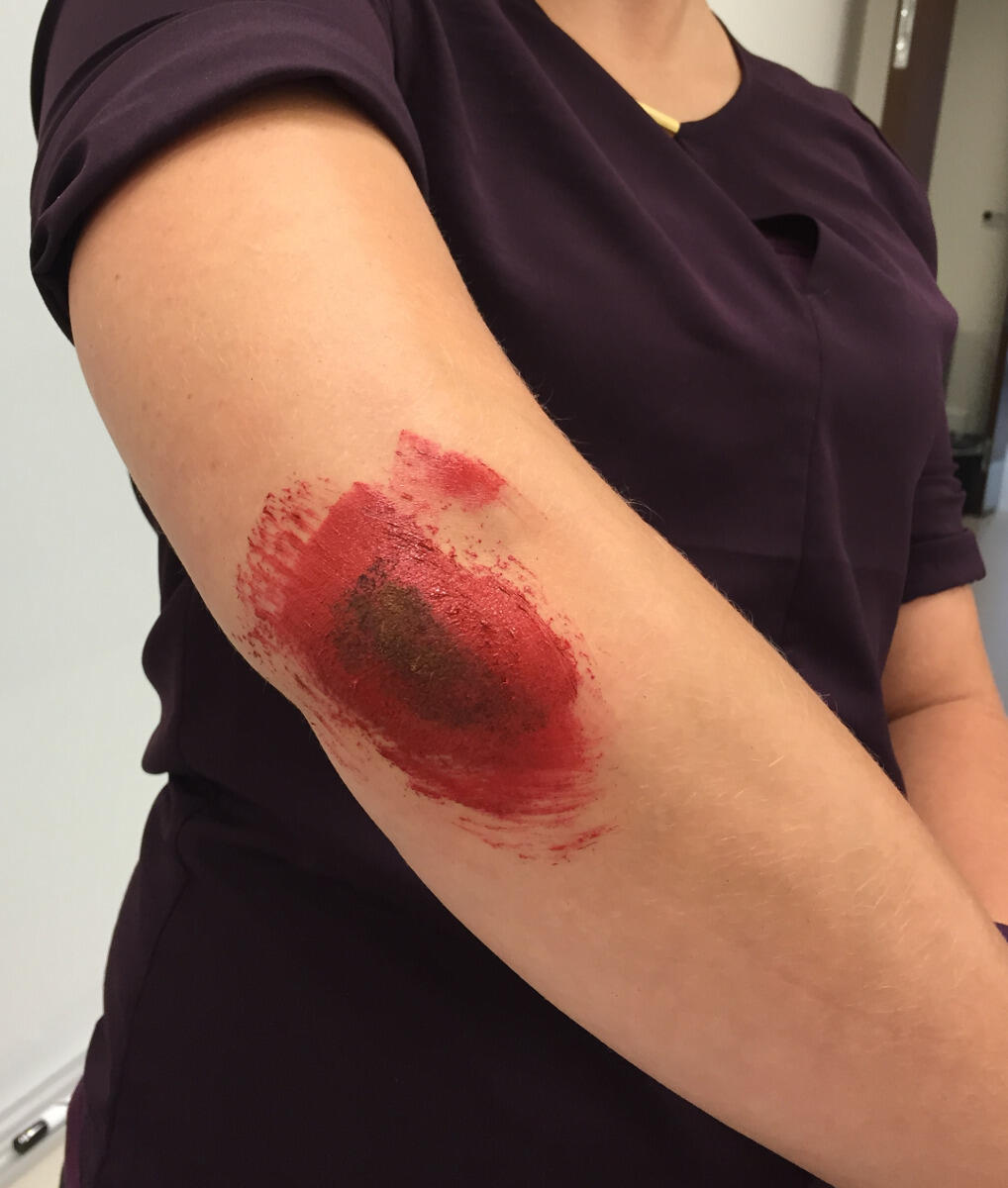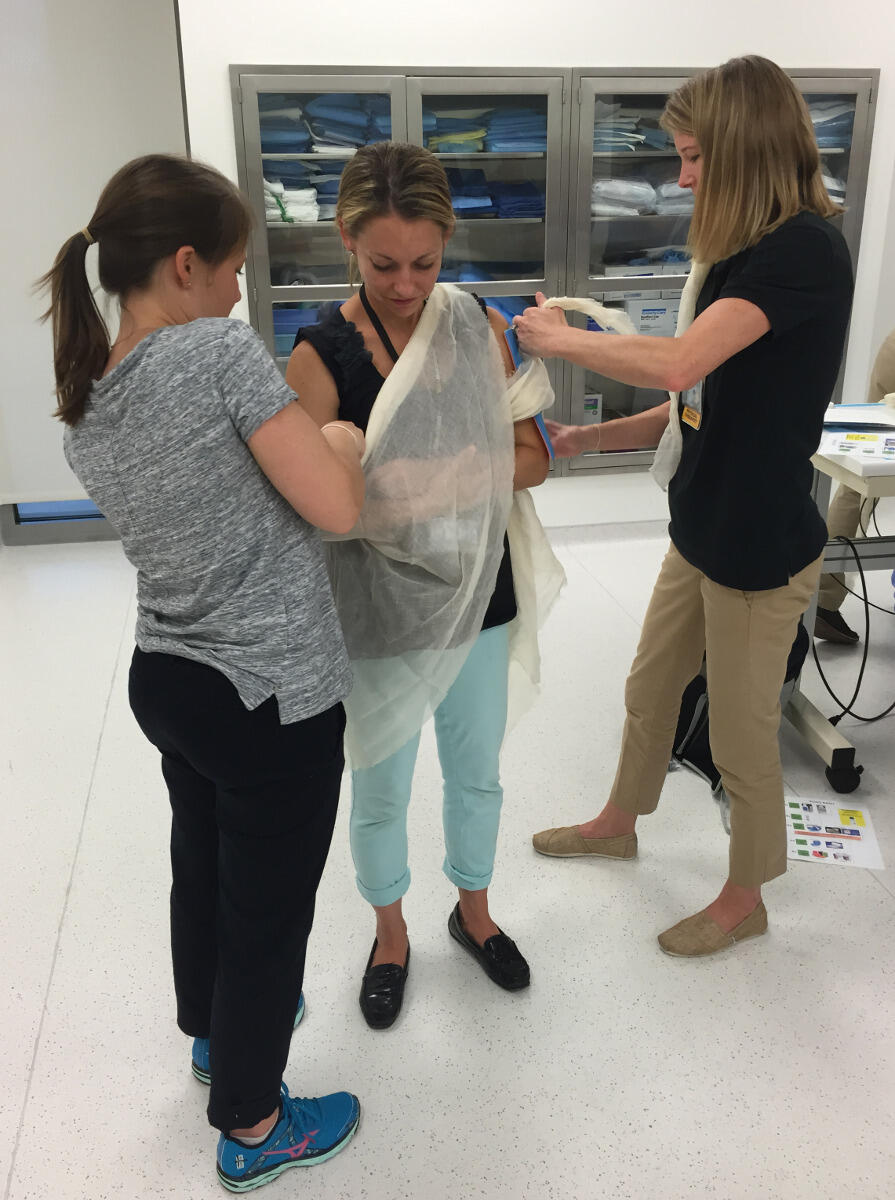
Sept. 8, 2015
VCU Health: Preparing for the Worlds
Share this story
A collection of nurses, physical therapists, physicians and care partners from Virginia Commonwealth University Health watched as a patient with a large road rash abrasion on her elbow had her wound assessed, cleaned and bandaged. In addition to road rash, the caregivers were reviewing how to treat other injuries such as scrapes, cuts and thermal and friction blisters.

Luckily, this patient’s wound was not a real road rash abrasion. Instead, it was applied with paint the colors of blood, dirt and sand to look authentic. The exercise was part of a simulation training designed to ensure coordination on the correct protocol to treat patients with these types of injuries. The protocol was developed for a very specific patient in mind – professional cyclists.
The UCI Road World Championships, cycling’s pinnacle event, is scheduled for Sept. 19-27 and its courses will loop through or near both of VCU’s campuses. VCU Health is the event’s exclusive medical provider. More than 1,000 cyclists are expected to compete.
During the race, medical tents will be deployed in various locations, and VCU Health physicians, nurses and physical therapists will be on hand to tend to any injuries. On the course, nurses and physicians will ride in cars behind the action in case of accidents. One medical provider will also ride along on a motorcycle. In addition, nurses will be available in the fan zones around the city and will offer comfort care to spectators – an estimated 450,000 are expected over the course of the event.
To be able to train and experience simulated injuries prior to the event is essential for the medical staff to be able to quickly respond during this once-in-a-lifetime event.
The simulation training was held last month in the VCU Center for Human Simulation and Patient Safety for everyone providing care to the athletes before, during and after the race.
Robin Manke, director of emergency management and telecommunications at VCU Health, has been deeply involved in the planning and preparation of VCU Health’s medical sponsorship of the nine-day competition.
“To be able to train and experience simulated injuries prior to the event is essential for the medical staff to be able to quickly respond during this once-in-a-lifetime event,” Manke said.
During the training, care providers reviewed and practiced how to splint and sling common bike injuries such as fractured clavicles, arms, and collarbones; how to clean, treat and bandage common wounds such as road rash, scrapes and blisters; how to tie tourniquets; and how to treat more serious injuries with QuikClot, a topical dressing for the local management of bleeding wounds. QuikClot is made with kaolin, a naturally occurring, inorganic mineral that accelerates the body’s natural clotting process. It works on contact with blood to immediately initiate the clotting process.
Rebecca Moran, D.P.T., a physical therapist in VCU’s Sports Medicine Clinic, was the lead trainer on wound and abrasion care. Moran provided medical care during the 2014 USA Cycling Collegiate Road National Championships held in Richmond in May 2014. Her experience with that race prompted her to connect with Tod Brindle, a nurse clinician and wound care specialist with the wound care team at VCU Medical Center.
“At collegiate, a racer would come into the tent and we had five medical providers with five different ideas on how to wash, clean and bandage the wound,” Moran said. “Nurses do it a little different than physicians and physicians do it a little different than therapists, so we decided it would be best if there was a protocol in place that would provide the same consistent care – and fast – to all of the cyclists.”

Brindle, one of five nurses nationwide to receive the prestigious American Nurses Credentialing Center’s National Magnet Nurse of the Year award in 2013, reviewed wound care for common bicycle injuries, and how to bandage injuries so the athlete is comfortable for the duration of the race.
“These athletes want the thinnest and least amount of bandage and/or wrap as possible,” Moran said. “The goal is to get them in, get them treated and get them back on the course as fast as possible.”
Subscribe to the weekly VCU News email newsletter at http://newsletter.news.vcu.
Subscribe to VCU News
Subscribe to VCU News at newsletter.vcu.edu and receive a selection of stories, videos, photos, news clips and event listings in your inbox.









